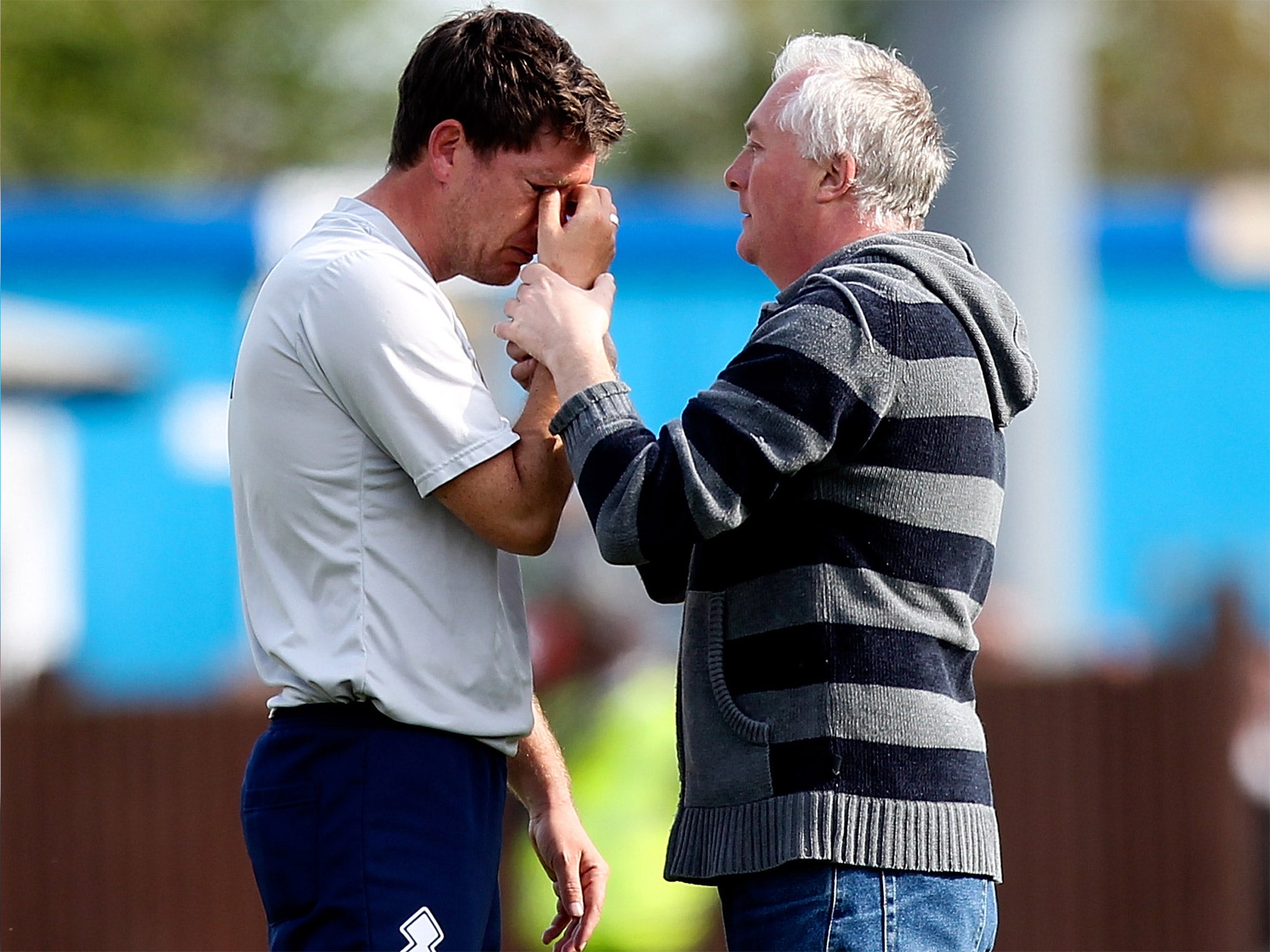Simon Hart: A tearful Clarke took Bristol Rovers out of the League but is now close to redemption
Life Beyond The Premier League

Anybody seeking a picture to sum up the pain of relegation should search on YouTube for the post-match interview that a tearful Darrell Clarke gave after his Bristol Rovers side slipped out of the Football League for the first time last May.
It was not what anybody at the Memorial Ground had envisaged when Clarke, 37, stepped up from the assistant manager’s role to replace John Ward on 28 March last year with Rovers three points above the relegation places, and when it happened, a promising managerial career suddenly looked in jeopardy.
“Having been the manager that had taken the club down after eight games there was a lot of unrest and a lot of people wanted a change,” Clarke admits. Yet it is a testament to the abilities of a man who had previously lifted Salisbury City two divisions into the Conference that he will mark a roller-coaster first year in charge against Macclesfield on Saturday with Rovers looking well placed to recapture their lost League status. His rebuilt side sit second in the Conference table, a point behind leaders Barnet, after a run of one defeat in 15 games, and are pushing hard to become the first team in a decade to bounce straight back up.
“It still haunts me a bit now if I’m honest because the last thing you want on your CV – and for the fantastic supporters at the club – is to get relegated into non-League but it’s just about picking it back up again,” the former Mansfield and Hartlepool midfielder tells The Independent. “I took it very hard through the summer. I was the manager that actually sent the club down, although there were certainly a lot of factors going into that, but I was pleased that the board didn’t put the blame on me and let me get on with my job.”
To understand the scale of this rebuilding task, he lost 20 players last summer and found his playing budget cut by almost £1m – the cost of the “double whammy” of Rovers’ relegation and former tenants Bristol Rugby Club’s departure from the Memorial Stadium to ground-share with Bristol City at Ashton Gate.
“We lost revenue on a couple of fronts,” Clarke continues, “but I knew we could get better players in for a lot less. Bristol Rovers were paying too much money on wages in previous years and we got on with it and brought in hungrier players.”
He feels he was “let down by one or two players last season” but has a tighter group now, supplemented by loan signings, such as recent additions Chris Lines from Port Vale and Jermaine Easter, the former Crystal Palace and Millwall forward. “You have to work the loan market at this level,” he says. “It is difficult but it helps with the budget and keeps that down.”
The loss to injury of Stuart Sinclair, a midfielder recruited from his former club Salisbury in the summer and arguably Rovers’ player of the season, has not helped, but Clarke has handled supporters’ expectations impressively and ensured the mood remains upbeat. The posters calling for his sack during a difficult start to the campaign – when an angry fan boarded the team bus after one away game – are a distant memory with home gates averaging over 6,000. “I believe Bristol Rovers should be in the top 10 of League One – the potential is there,” adds Clarke, whose coaching staff includes two Rovers old boys in Marcus Stewart, his No 2, and Steve Yates.
To fulfil that potential, it would help if the club were successful in their upcoming High Court case action – to be heard in May – against Sainsbury’s over the supermarket’s threat to pull out of a £30m deal to buy the Memorial Stadium, a sum the board need to go ahead with plans to build a new 21,700-capacity ground beside the University of the West of England in Stoke Gifford.
That has been another drain on Rovers’ resources, but all Clarke can do is concentrate on the football and his own fight to get out of the Conference. “I’ve focused on bringing a strong mentality to the group and we find ourselves in a great position with six games to go,” he says. “It might just go down to the wire.”
And if they end up in the play-offs instead, there is still hope, given Clarke’s experience of winning two promotions that way with Salisbury. “It has stood me in good stead the three years I had at Salisbury,” he adds. “You are always learning as a young manager but even at my age I’ve managed 200 games now and my win percentage is over 50 per cent.” It is an impressive ratio and it raises hopes there will be no final-day tears this time around.
Subscribe to Independent Premium to bookmark this article
Want to bookmark your favourite articles and stories to read or reference later? Start your Independent Premium subscription today.

Join our commenting forum
Join thought-provoking conversations, follow other Independent readers and see their replies